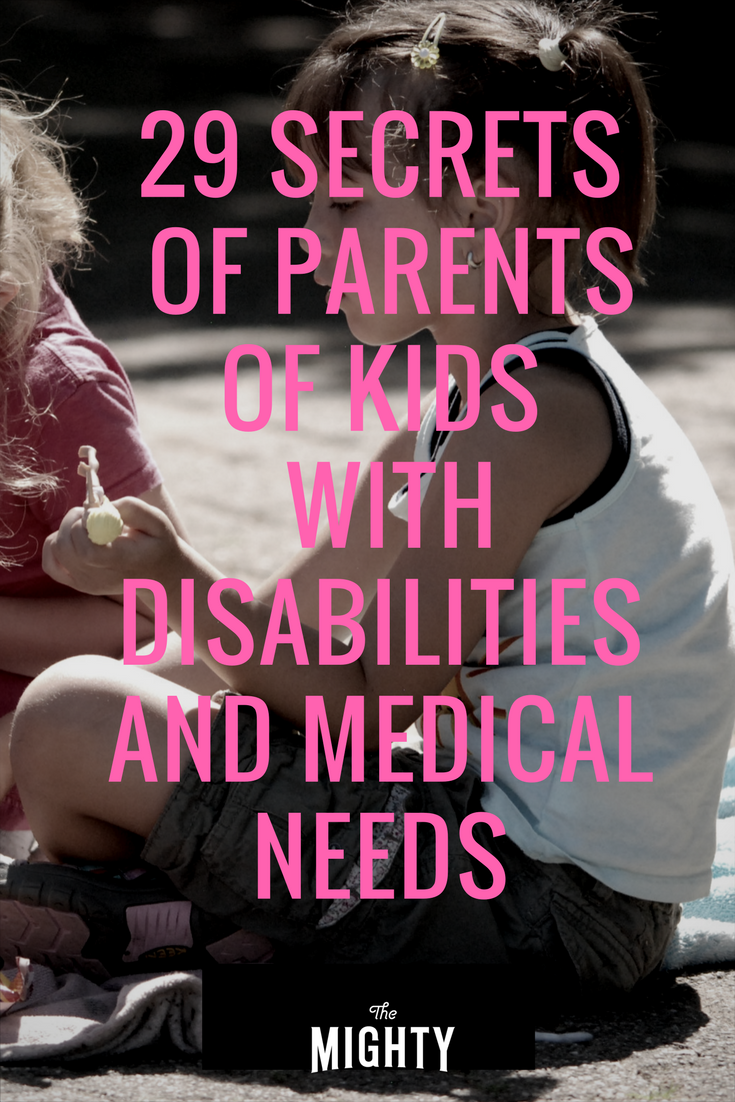Parenting can be a joy and a challenge. No matter how much we love our kids, there are always good and bad days, and when you parent a child with a disability, the lows can feel really low, and the highs can feel really high.
Sometimes we might wonder, “Does anyone understand what it feels like to walk in our shoes?” Many of us just want to know we are not alone as we learn the best way to help our kids thrive.
We wanted to know what parents raising children with disabilities or medically fragile children wish people understood about their experiences, so we reached out to our parenting community to ask. Perhaps these answers will help you realize you’re supported or encourage you to reach out to a parenting friend who may feel similarly.
Here’s what our community had to say:
1. “I feel… isolated. I’m busy keeping up with medical stuff day to day and multiple appointments. The people I talk to (not even friends) are mostly moms with [children with medical needs] I have met in online groups. I can’t remember the last time I had coffee with a friend or they sent me a message first. I’m sorry my life is so busy, but don’t give up and leave me behind.”
2. “When [people] say, ‘I don’t know how you do it,’ it [doesn’t feel] as sympathetic but as an insult. My son is [not] some kind of horrible burden who needs a superhero to parent him. [I am] doing what’s right and raising my son to be the most independent and productive member of society as he is capable of being. [That phrase communicates] loving him and wanting to go above and beyond is something the masses could never imagine being tasked with.”
3. “I’m doing the best I can. I’m not super human and you’d do this, too, if you had to. There are hard days [when] I don’t know how we’ll make it, but she’s my daughter and my entire world. I’ll do anything for her.”
4. “Most days I am completely exhausted and running on no sleep. Also, please remember that activities that tend to be simple for you and your ‘typical’ kids tend to be much more difficult for us. We [are also] likely to cancel plans at the last minute. So please, give us grace.”
5. “It feels like people treat our life like a tragedy or they completely ignore the struggles and needs we do have. No one really grasps how incredible the joys of this journey are or how hard it is. You can’t have one without the other.”
6. “I do want to come to the party. I do want to come out for tea. I wish I could come to the park with you anytime at all. But sometimes it’s easier to stay at home, sometimes I have to stay at home. It doesn’t mean I don’t want to be friends, but sometimes it’s hard.”
7. “I wish people understood all those simple suggestions they impart upon us — less sugar, firmer discipline, insert your ridiculous idea here — are offensive and demeaning. Until you are on the front lines you have no right to approach me, let alone judge me when I am doing my best. I have a team of trained professionals I pay for, whom I exhaust myself to go see, coaching us. Your snide remarks and ‘helpful hints’ are nothing more than thinly veiled insults towards my parenting. You don’t know [my child’s] medical history, you don’t know our struggle. You look at him having a sensory meltdown and see us failing when in reality getting dressed and in the car seat was a huge win for us. You are demeaning what we do every day to work together as a family unit. So unless you have a kind word or want to hold my purse while I provide a therapeutic hug, just leave us alone. You don’t understand and you never will.”
8. “People say (in a completely genuine and heartfelt spirit), ‘You are amazing and so much stronger than I could ever be!’ or ‘I don’t think I could do it.’ And I desperately want to tell them that they absolutely are that strong and [if] faced with mothering a child [with a disability], you can and will do amazing things you never thought possible.”
9. “When I share an accomplishment my kid has made, possibly years delayed even, don’t counter with one about your ‘typical’ kid. Let me have my moment.”
10. “My child can’t walk, but she damn sure knows when you talk down to her. We know the work our child put into something as ‘small’ as writing her name was just as much as a musician puts in for first chair, and we beam with pride over it. We’ve seen the lowest of lows, and because of that we are capable of seeing the pot of gold in anything.”
11. “I want people to know I cry alone sometimes.”
12. “I want people to understand that children with disabilities are still children. They also need kindness and understanding. They should not have to be put in a box to fit society’s idea of what ‘normal’ is.”
13. “I want people to know it is OK to ask questions, but ask them to those who have experienced what you are curious about. Ask me whatever you wish, I will answer as honestly as I can, because if you have the facts, then you can be a positive influence on others who are lacking in knowledge. Knowledge is the tool that will inspire compassion and understanding.”
14. “We are not ‘special’ because of our daughter with a disability.”
15. I want people to know that having a child with a disability means that one day we will have a teen with a disability. Most people are usually understanding when it’s a smaller child ‘acting out’ or just acting ‘different’ in general. Please remember that my 6-foot-tall teenage son may look like a full grown man, but we still struggle, and sometimes desperately need understanding.”
16. “I wish people would know that my children are so much more than their diagnosis.”
17. “Try [not to ask] questions like, ‘What does he have?’ or ‘What’s wrong with him?’ Those are ignorant comments and deeply offensive.”
18. “I wish people understood that because my son is a wheelchair user does not mean his life is doom and gloom. In fact, it is the exact opposite, and he makes it that way. He is full of energy, life, happiness, and spirit. He faces his challenges head on and is stronger than anyone I know. Being in a wheelchair doesn’t mean that his life is miserable, it just means he sees it from a different view.”
19. “We are scared. We are scared to lose [our] child.”
20. “Sometimes a little compassion goes a long way when you are having a bad day in public. A kind word, a friendly offer of help can [be uplifting].”
21. “We will probably be late. Please be patient because we have good intentions. Last minute mishaps happen.”
22. “Nonverbal in no way means quiet.”
23. “I wish they knew how hard we have to fight for services and help. Also we are in the middle of a battle to keep healthcare for our children. We are almost in a hostile environment, and we struggle with lack of sleep and support.”
24. “Life is not ‘one size fits all.’ Even though people and families share the same disabilities, ‘life’ is much different for everyone. Personally, I am a believer that where you live is a huge contributor to the ‘kind’ of life you’re able to live. Where I live, the disabled community is not a priority, therefore, opportunities and understanding, are seriously lacking.”
25. “You will never understand the full extent of this life until you live it. My daughter is able, my daughter is strong and determined and her accomplishments are everything to me, and I will celebrate every tiny step.”
26. “I want people to understand that I will not ask for help. I will try to do everything for my child, on my own. If you want to be involved in my life, you need to take the ‘I will help you approach’ and just help. I don’t want to feel like I am being a burden to anyone else so you just need to jump in and help without being asked. Also, don’t be offended that I don’t ask for help. It’s who I am. I deal with my child’s needs on a daily basis (24 hours a day) and asking for help is hard.”
27. “Realize it’s OK to be happy, sad, scared and blessed at the same time. Raising a child with disabilities is a constant roller coaster ride, and no matter how hard it can be, it is the biggest thrill of [my] life.”
28. “I’s absolutely heartbreaking to watch your child (my son is now 18) be left out of everything because he’s ‘different.’”
29. “I like to shamelessly brag about my son. His accomplishments may be different compared to your children’s, but please understand they are extremely important to both of us. Our lives may be different from yours, but they aren’t any less, so please do not respond with pity when I tell you about him. He is my pride and joy, and I am so honored to be his mom.”
What do you wish people understood about your life as a parent to a child with a disability or medical needs? Or, if you are an adult with a disability, what advice would you give to parents? Let us know in the comments below.


